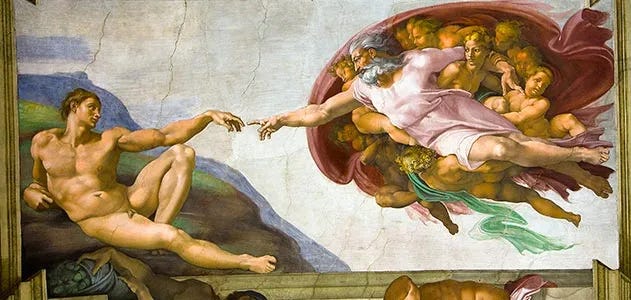Why Calling Someone Else a 'Genius' Holds You Back
Don't give in to the "Genius Myth." It's just a way of letting yourself off the hook.
It’s easy to buy into the idea that some people are “geniuses” who are in a different intellectual league than the rest of the world.
There are many reasons we fall for that myth, but the most pervasive reason is that it helps us feel better about ourselves.
“Our vanity, our self-love, promotes the cult of the genius. For if we think of genius as something magical, we are not obliged to compare ourselves and find ourselves lacking…To call someone ‘divine’ means: ‘here there is no need to compete.’” -Frederich Nietzsche
However, this genius myth is pernicious, and it affects how we relate to others and how we think about ourselves.
There are three reasons why we should reject the concept of “genius”:
(1) The genius myth limits our perception of our own potential.
Believing in the genius myth places an upper limit on what we think we can accomplish, as we do not classify ourselves in that upper strata of potential reserved only for the unique class of “geniuses.”
We know we can achieve some modicum of success in life, but we mentally reserve the highest levels of attainment for the Einsteins, Michelangelos, and Zuckerbergs of the world.
This belief functions as a false ceiling on our potential. We don’t dream big enough or take the risks necessary to achieve greatness because inside we’re not sure we have what it takes.
The myth holds us back.
As the Nietzsche quote above describes, the myth also lets us off the hook by whispering that we don’t need to compete with the “genius” class.
Hard work is the mechanism that allows us to tap into brilliance.
It opens the floodgates of genius in all of us.
We all have brilliance inside of us. We just need to exert the effort to mine it.
(2) The genius myth discounts the importance of hard work.
Chalking up someone else’s success as “genius” is a slap in the face. Terms like that imply the person was born with a gift—they’re a fortunate recipient in the genetic lottery.
While that may indeed be true (everyone is born with a different level of intelligence and raw ability), millions of decisions after birth determine what each of us will become.
Many successful people throughout history have understood this and wanted to be praised for their work ethic rather than their raw talent.
“There’s no talent here, this is hard work. This is an obsession. Talent does not exist, we are all equal as human beings. You could be anyone if you put in the time. You will reach the top, and that is that. I am not talented, I am obsessed.”
-Conor McGregor, UFC Featherweight and Lightweight Champion

Founding Father Alexander Hamilton was known to have an outsized ego, but he did not hesitate to credit his success to his work ethic:
“Men give me credit for some genius. All the genius I have lies in this: when I have a subject in hand, I study it profoundly. Day and night it is before me.”
Was Hamilton brilliant? Absolutely.
But he was also renowned for his prodigious work ethic and ability to spend limitless hours reading and writing.
Famed inventor Thomas Edison believed that “genius is one percent inspiration and ninety-nine percent perspiration.” You may think, “Sure, it’s easy for Edison to say that because he was a freaking genius.”
I agree — Edison was smart, but he was also the one who tried 10,000 different filaments before finding one that could create a commercially viable light bulb.
In a raw moment, Michelangelo shared similar feelings about the work that helped him attain his success:
“If people knew how hard I worked to achieve my mastery, it wouldn’t seem so wonderful after all.”
Michelangelo’s artistic ability rivals anyone else in history and he undoubtedly was born with a gift. However, we should remember that he was still working and perfecting his craft until the week of his death at age 88.

Hard work is the mechanism that allows us to tap into brilliance. It opens the floodgates of genius in all of us.
Hard work is also the differentiator between the people whose names grace the pages of our history books and the countless number of equally gifted individuals who didn’t put in the effort to realize their talent.
How many other Hamiltons were out there who were brilliant but didn’t devote thousands of hours to reading and writing?
How many other Edisons were out there who couldn’t muster the determination to test the 100th filament, let alone the 10,000th one?
How many other Michelangelos were out there who tasted early success and thought they had “made it,” so they stopped striving to learn new things?
“Everyone who strives to reach his potential must pay a price—in time, effort, resources, and opportunities missed. Many people fail to pay the price that their potential demands.” -John Maxwell
(3) The genius myth discounts the “scenius” effect.
Musician Brian Eno coined the term “scenius” to describe the way that groups of like-minded people push the world forward:
“Scenius stands for the intelligence and the intuition of a whole cultural scene. It is the communal form of the concept of the genius.”
The Impressionist movement is a great example of the scenius effect.
The movement began in Paris in the 1860s, when four young painters realized they shared an interest in plein air painting (painting outdoors rather than inside an art studio). The four artists (Claude Monet, Pierre-Auguste Renoir, Alfred Sisley, and Frédéric Bazille) began meeting together at Café Guerbois in Paris.
Soon they were joined by other artists who would leave an indelible mark on the history of art: Édouard Manet, Camille Pissarro, and Paul Cézanne.
The group bonded over shared rejection. The prevailing art establishment (the snobbish Académie des Beaux-Arts’ Salon de Paris) had rejected many of the artists’ paintings, saying the paintings looked unfinished—that they were mere “impressions” rather than finished pieces of art.
But the Impressionists banded together, spurring each other on to creativity and eventual success.
Behind every “genius” is a mountain of determination, an ocean of sweat, and a posse of other intellectual giants.
Thanks to the Impressionist scenius, we have incredible pieces of art painted by the “geniuses” who have now become household names: Manet, Monet, Cézanne, Renoir, etc.
Each of these artists was gifted, but their creativity was unleashed through the power of their group.

Have you unconsciously let yourself off the hook to do something great because you don’t think you have what it takes?
In other words, have you been hiding behind the genius myth?
Remember: behind every “genius” is a mountain of determination, an ocean of sweat, and a posse of other intellectual giants.
Will you put in the hard work to mine the brilliance inside yourself?



All 3 points valid. There are geniuses in our times also .